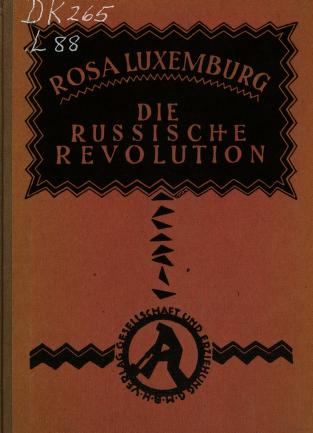Top Qs
Timeline
Chat
Perspective
The Russian Revolution (pamphlet)
1922 pamphlet by Rosa Luxemburg From Wikipedia, the free encyclopedia
Remove ads
The Russian Revolution (German: Die Russische Revolution) is a pamphlet written in 1918 by Polish-German Marxist theorist Rosa Luxemburg. It was posthumously published in 1922 by fellow Spartacist Paul Levi.[1]
Remove ads
Summary
Summarize
Perspective
Luxemburg discusses the 1917 February and October revolutions in Russia. Her three major criticisms of the policies implemented by the Bolshevik Party were its korenizatsiya policy of self-determination for ethnic minorities, its distribution of land to individual peasant farmers instead of immediate collectivization, and its anti-democratic dissolution of the Russian Constituent Assembly.[2] In general, Luxemburg was critical of Bolshevik leader Vladimir Lenin's centralization of power and creation of a single party state,[3] and the suppression of civil liberties such as freedom of the press, association and assembly.[4] However she had been in prison at the time of writing the pamphlet and, according to her friend Clara Zetkin was therefore without access to all relevant information and changed her opinion later. The pamphlet also states that “The Party of Lenin was the only one which grasped the mandate and duty of a truly revolutionary party…”[2]
Sections of the work include:
- Fundamental Significance of the Russian Revolution
- The Bolshevik Land Policy
- The Nationalities Question
- The Constituent Assembly
- The Question of Suffrage
- The Problem of Dictatorship
- The Struggle Against Corruption
- Democracy and Dictatorship
Remove ads
References
Wikiwand - on
Seamless Wikipedia browsing. On steroids.
Remove ads

